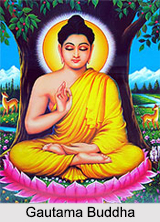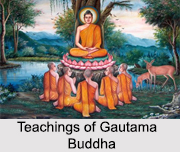 Gautama Buddha was the founder of Buddhism. He was born as a Sakya prince, Siddhartha Gautama. He is also known as Sakyamuni and his birth, teachings, death and the rules for the Sangha are to be found in the Buddhist canons. Buddha is the title given to the founder of Buddhism, one of the world"s great religions. The word "Buddha" means "Enlightened" or "Awakened One". Another of his titles is Sakyamuni, which means "the wise man of the Sakya clan".
Gautama Buddha was the founder of Buddhism. He was born as a Sakya prince, Siddhartha Gautama. He is also known as Sakyamuni and his birth, teachings, death and the rules for the Sangha are to be found in the Buddhist canons. Buddha is the title given to the founder of Buddhism, one of the world"s great religions. The word "Buddha" means "Enlightened" or "Awakened One". Another of his titles is Sakyamuni, which means "the wise man of the Sakya clan".
Birth of Gautama Buddha
Siddhartha was born in Lumbini, now in Nepal, in 624 BC. Buddha was born to King Suddhodhana and Queen Maya Devi. He was born on a full moon day in the month of May. Soon after his birth an astrologer predicted that Prince Siddhartha was destined to lead the life of a sage and that he would give up his right to the throne and all worldly pleasures.
Early Life and Marriage of Gautama Buddha
Buddha was named Tathagata or Siddhartha. Gautama was his family name. Within a few days after his birth Siddhartha"s mother died. He was then looked after by Maha Pajapati Gautami, his maternal aunt and his stepmother. Buddha was a Kshatriya by birth and had military training in his upbringing. At the age of 16 he was married to Yasodhara. He spent 29 years as the prince of Kapilavastu and led a happy married life. He was blessed with a son named Rahul.
Great Departure of Gautama Buddha
No matter how hard King Suddhodhana tried to shield his son from the knowledge of human pain and suffering, Siddhartha came face to face with real world. Sometimes Prince Siddhartha would go into the capital city of his father"s kingdom to see how the people lived. During these visits, he came into contact with many old people and sick people, and on one occasion he saw a corpse. One was suffering from old age, a sick man, a dead body and an ascetic. He was so disturbed by these sights he decided to renounce the material world and look for truth. He wanted to find a way that would put an end to such pain and suffering. With this aim he fled from his palace to become the Buddha.
Great Enlightenment of Gautama Buddha
Siddhartha then made his way to a place near Bodh Gaya in India, where he found a suitable site for meditation. There he focused single-pointedly on the ultimate nature of all phenomena. After training in this meditation for 6 years he realized that he was very close to attaining full enlightenment. So he walked to Bodh Gaya on the full moon day of the 4th month of the lunar calendar, he seated himself beneath the Bodhi Tree in the meditation posture and vowed not to rise from meditation until he had attained perfect enlightenment. He attained enlightenment at the age of 35 after passing through the phases of asceticism and meditation under the Bodhi tree. This place is now a famous Buddhist Pilgrims Centre.
 Teachings of Gautama Buddha
Teachings of Gautama Buddha
Buddha"s teachings contour the base of the religion whilst making it to stand out as an individual doctrine, a philosophy that is far more than just a religious concept. Buddha did not deny that there is happiness in life, but he pointed out that happiness does not last forever. Buddha"s teachings are a step-by-step way towards lasting happiness. Happiness never decreases by being shared. This concept of sharing his teachings and passing the pious concept of Buddhism from one to another further supported his disciples in spreading Buddhism. Amidst the concept of Four Noble Truths and in the midst of the idea of the Noble Eightfold Paths, Buddha preached the simplest way to attain Nirvana. The simplicity of the religious principles of Buddha won a number of hearts.
Buddha formed the Sangha with his five companions. He was at the Deer Park, Sarnath to deliver the first sermon of his life. With the formation of the Sangha or the order of the monk the concept of "Triple Gems" also came into existence. The Sangha too carried on with the spread of Dharma. The disciples of Buddha therefore included both the monasteries as well as the lay followers who later spread Buddhism as an individual religious concept.
Death of Gautama Buddha
Mahaparinibbana Sutta proclaims that Buddha passed away at the age of 80. He ate his last meal at Cunda"s dwelling place and fell seriously ill. However Buddha announced that the meal had nothing to do with his sickness. He was bound to leave the world at that time. Soon he attained Parinirvana at Kusinara.









